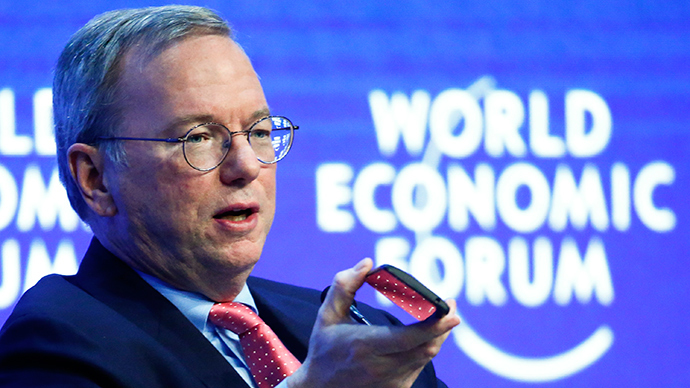At the World Economic Forum in Davos, Switzerland, Google guru Eric Schmidt gave an answer regarding the evolution of the web. “I will answer very simply that the internet will disappear,” Schmidt said on Thursday.
“There will be so many IP addresses, … so many devices, sensors, things that you are wearing, things that you are interacting with that you won’t even sense it, it will be part of your presence all the time,” he explained. “Imagine you walk into a room, and the room is dynamic. And with your permission and all of that, you are interacting with the things going on in the room.”

“A highly personalized, highly interactive and very, very interesting world emerges,” Schmidt concluded.
At the panel, dubbed “The Future of the Digital Economy”, he was speaking with Vodafone CEO Vittorio Colao, Facebook COO Sheryl Sandberg, and Microsoft CEO Satya Nadella.
Vodafone’s Chief Executive Officer Vittorio Colao agreed with Schmidt, comparing the internet with “water, oxygen” in an “ultra-dense connectivity situation.”
Will we be able to "feel" things on the internet? http://t.co/CpqQVn0ifo#wef15#futurewebpic.twitter.com/2CYbbf8UFO
— World Economic Forum (@wef) January 22, 2015
However, a group of Harvard professors depicted a much more grim Orwellian world, AFP reported on Thursday.
“Privacy as we knew it in the past is no longer feasible... How we conventionally think of privacy is dead,” said Margo Seltzer, a professor in computer science at Harvard University.
Sophia Roosth, a Harvard’s genetics researcher, said: “It's not whether this is going to happen, it's already happening... We live in a surveillance state today.”
Depicting a terrifying world, where mosquito-sized robots fly around stealing samples of people’s DNA, she said, “We are at the dawn of the age of genetic McCarthyism,” referring to “witch-hunts” during Second Red Scare in the 1950s in America.

